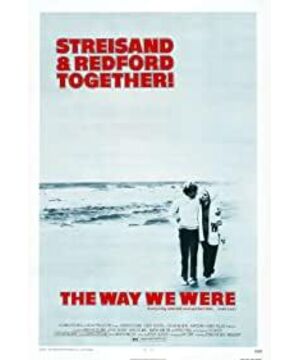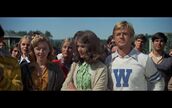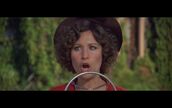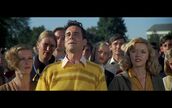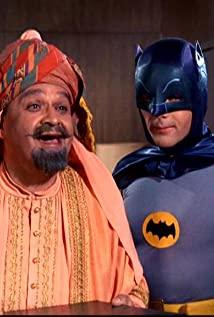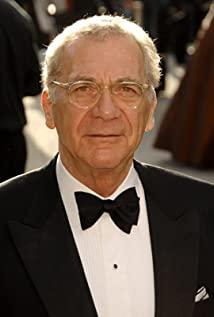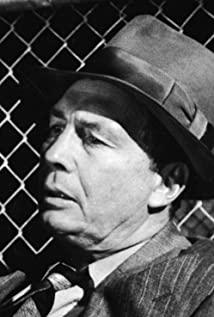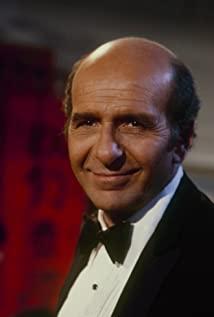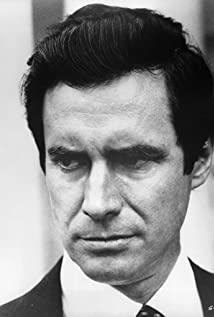1. An overly serious attitude towards life and an extremely easy one, full of game attitude and spirit of play, one who treats many things as a joke, stays out of it easily, and holds a kind of ridicule with a distance and thus an advantage The attitude of judging and speaking has become the established tone of the two protagonists in the parallel montage paragraphs of the opening subtitles.
2. A love story is also a brief history of the United States before and after the war, or a spiritual history of urban intellectuals and artists. It is also a love story about "love alone is not enough". The highly personal nature of love and the highly social and political group nature are perfectly combined in this film.
Today I would like to share with you a Hollywood melodrama - "Feelings of the Past", its English name is "The Way We Were". When I first saw this movie on the big screen, its Chinese translation was "Looking Back at the Years". You may have encountered it in a non-movie way, because the theme song of the same name "The Way We Were" was sung by Barbra Streisand (Barbra Streisand), who played the heroine of the film, and the popularity of this song even surpassed this movie.
It's a 1973 Hollywood love story, and it's the only Hollywood melodrama I've chosen in our 52-film sequence. The first is the director of the film, Sydney Pollack, who is one of the representative directors of New Hollywood. It's just that among the many directors of New Hollywood, he is a director who is relatively ordinary and more mainstream. I think you may have encountered this director in other works, because he is also a rare film and television amphibious director of his generation. He directed a large number of TV series, so he is not so in the film industry. Prominent, but you may know one of his very important works, Out of Africa, which was also the best picture at the Oscars.
In the two films, "Old Times" and "Out of Africa," we're going to see something in common, a path that Sidney Pollack excels at, which is through Hollywood melodrama as an African Genre type writing, through the collision of the protagonist's character in melodrama or love story, the twist of fate, including an atmosphere, a mood, and an emotion gradually accumulated by non-dramatic events most of the time, to convey the author himself Reflections on life and society, and at the same time show American society through one or several groups of characters.
In that sense, Sidney Pollack was less edgy, less radical, less original than his contemporaries. However, from another point of view, he faced the American social reality more directly than his contemporaries, and confronted the profound contradictions and problems of American social reality.
Going back to this movie, the second reason I chose it was that it was a Hollywood melodrama that I was exposed to on the big screen earlier in my youth, and it was also one of the very few during my first viewing. It touched me deeply, for me it is a very personal life experience and the experiential existence of life. It wasn't until much later that I saw the heroines frequently mention this movie in the episodes of "Sex and the City" in their conversations, and it was an opportunity for me to realize that this movie had touched me back then. The movie has also touched a generation of Americans.
In the way of Sidney Pollack and a love story, this film marked an extremely special era in American society and American history, that is, the 1960s, caused by the peace movement and anti-war movement caused by the Vietnam War. A generation in America took to the streets and was highly radicalized. And the film's production time is also meaningful. 1973 was the year when the United States was forced to withdraw its troops from Vietnam. During this period, American society experienced unprecedented upheavals, and even fell deeply into the so-called constitutional crisis. among. In other words, in the short history of the United States, this is an era full of crises, and it is also the most dynamic era in American society. society, and irreversibly transformed American society. In a sense, the American society we know today is the result of the 1960s. The American society before that was not like this at all.
After a general introduction to the background we move on to the video. This is a love story, and when we say it is a love story, you may directly think of the American melodrama called "Love Story", and you may also think of famous love stories such as "Pretty Woman" story. This is another reason why I chose the film "Old Feelings", because it is a fascinating love story, but it is far more than a love story, it is also the American society of that era, and it is also the emotional integrity of a generation and the emotional logic and emotional structure of a generation.
This love story touched me, although I was still young at that time, and I may have many romantic dreams myself. But in fact, more importantly, in this film, the personal fate of the protagonist of the story, the emotional experience of the protagonist of the story and his final choice are rarely impacted by the big era and the major historical events. changed, penetrated.
This is perhaps an important difference between me and most of the listeners now. Maybe you are willing to admit that you are in a small era or be glad that you are in a small era, and we have no choice to be the so-called children of the big era or the children of the big era . A major difference between the so-called big era and the small era is probably that in the big era, every major historical event and every major political moment deeply impacts and affects your personal life at the same time. In an era when individualism can live alone, no individualism can isolate itself from social space.
And in the story, the fate of a pair of protagonists, the tragic direction of their love, is itself changed by a momentous historical moment, a momentous social turning point, a moment so cruel that you cannot turn your face away.
At the same time, one of the interesting things about my choice of this film is that it is similar to the films we have just mentioned. It expresses one of the most classic imaginations of love, which is called love across classes. Supported by a belief in the victory of immortal love over death, it seems that love, as a transcendent emotion, can cross many social divides.
Of course, to believe that love can transcend class, can transcend divide, can transcend race, and transcend isolation, that is a view of love. It is another view of love to believe that people must first survive and love to be attached, and to believe that love is just an emotion in the existence of real society and does not have great changes and transcendence. We can even use two different types of love imagination to distinguish the two eras we live in.
What this film and love stories, say, Pretty Woman, have in common is that they are all about love that transcends class status. I simply remind everyone that the word class and the fact of class and class are considered taboos in American society in a sense. Or in discussions of American social life, class is rarely discussed. The name of a sociology book that once had a huge impact and impact in China was originally called "Class" - "Class", but when we translated it, we translated it into "Taste". In this sense, you can say it is a cultural misreading or cultural mistranslation. In another sense, it is an accurate description of the class imagination within American society. The so-called class differences are not It is manifested in the huge gap in social status, and more in the different choices presented by different tastes.
There may be two important reasons for this. An important reason is that after the war, American society quickly formed its middle class as the main body in the process of establishing its position as world hegemony. The middle class can account for more than 80% of the whole society. In this case, the gap between the rich and the poor, or the fact of class, becomes extraordinarily unclear. Another important reason is that American society as a whole refuses to discuss their class facts, forming a consensus-level shunning or evasion of class topics.
Therefore, in such a movie, it is more accurate to say that it is a love that crosses classes rather than a poor girl falling in love with a rich boy. In this sense, it needs to bridge social awareness, social prejudice, and distances in the tastes and lifestyles of life. In this sense, the film has already told us this basic fact and the important tone of this love story from the very beginning.
I have been reminding everyone in each movie that if you love movies, if you want to watch and study movies in a relatively professional way, and if you want to have more fun from movies, please don't ignore the opening credits. Much of the narrative of the film, the establishment of the meaning of the film, the challenge of film art and the establishment of the film's audio-visual structure begin from the moment of the subtitle of the film.
In this film, you will notice that the entire title subtitle is first accompanied by the singing of Barbra Streisand, the actress who plays the heroine of the film, that is, "The Way We Were", which appears with this singing. is a set of long parallel montage clips. The two corresponding paragraphs formed by the parallel montage focus the camera on the hero and heroine respectively. You will see that the first occasion where the heroine appears is when she is handing out flyers, and the hero wins the competition on the sports field, and then we We see the heroine putting up a slogan, the hero wins another project, and then we see the heroine working in a restaurant to earn a living, while the hero spends leisurely time in a restaurant with other wealthy women their leisure time.
In such a parallel montage of alternate clips, it shows us two different ways of living, two different contents of life, and two different attitudes to life. It shows us what I really like at the end of the film is a reflection on American success rarely seen in Hollywood movies. At the beginning of the movie, we have heard a very important dialogue in the prologue of the love story. Of course, in different versions, the subtitles are handled differently, and some are completely mistranslations. One of the translations I like is in In the writing class, the teacher read aloud the heroine's work to the students, and the last sentence of the work was "Americans always smile because success comes so easily."
Everyone notices that there are two key words in the epilogue of this wonderful short story. The difference in the class identities of the hero and heroine of this story, the difference in their character, the difference in their way of life eventually leads to a serious conflict in their political positions, so that their love eventually fades and their relationship eventually aborts. One of these two important keywords is success. Of course, the counterpart to success is failure. You may know that in American English, loser can be counted as a dirty word, a very dirty and dirty word. , is a very heavy word, is a very vicious curse. Success and failure correspond to the study of success.
The latter keyword is easy. In English, in addition to being easy, another semantics is relaxation, relaxation, games, and entertainment. Corresponding to this is the heroine's be serious (serious, serious), and sometimes I see English subtitles in myself Or when I hear the English dialogue, I will subconsciously translate it into "true", an overly serious attitude towards life and an extremely easy one, full of game attitude and spirit of play, one who sees many things as a joke, relaxed To stand out of it, to judge and speak with a mocking, distant and therefore advantageous attitude, has become the established tone of the two protagonists in the parallel montage of the opening credits. Because we see first of all that in this story, the hero is always excellent, always successful, and beyond or above all this, he is always easy, he is always easy, he is always Easy, and this also brings up a very interesting moment in the film, the heroine asks the hero if there is anything difficult for you, and the hero doesn't answer. After a moment of hesitation, he leans over and kisses her. Loving this girl is not easy for him.
As mentioned earlier, the selection of this film is not just because it is a wonderful Hollywood love story, but also because it is a melodrama that is larger than a love story. In the story of love, it tries to deal with the American history before and after the war, and at the same time tries to deal with one of the most important basic issues and basic conflicts in the world before and after World War II in the 20th century, that is, the left wing and right wing, radical and conservative, communism and fascism, communism and capitalism. This is a very interesting point, because in my opinion, there is a perfect combination between the highly personal nature of love stories or love and the highly group nature of society and politics in this film.
The film contains several narrative times. Its first narrative time is during World War II, in New York during the war, the reunion of the hero and heroine under the state of war, and then the flashback brings us into the 1930s, The whole of Europe is in the midst of a war on the verge of a war, and the whole of Europe is at a tense moment in history when communism faces fascism head-on, while the free world sits on the sidelines. Then we went back to the time of World War II, and the story then turned to life after the war, to the 1950s, the most sluggish and dark time in American history. In the film, the fate of the protagonist is closely related to the late 1950s, the history of the United States. During the darkest scandalous political period of last year, namely McCarthyism, the Un-American Activities Committee engaged in massive and gross interference in the lives of citizens, in their political beliefs, in their political choices, and in pervasive surveillance and aggression. behavior has become an intolerable everyday fact of American life.
It is also at this grim moment that the story takes a dramatic reversal, the fate of the protagonist is completely changed, and the story continues to extend backwards, to the end of the film, we again see the heroine distributing leaflets on the street, and The flyer she distributed this time was against war, against nuclear war. It was a starting moment in the filming era, when the anti-war movement triggered by the Vietnam War was about to take American society by storm and rewrite American society.
Therefore, it is very interesting that a love story is also a brief history of the United States before and after the war, or a spiritual history of urban intellectuals and artists. It is also a love story about "love alone is not enough". To express it with a wonderful line from the movie called "Love Story", "even the purest love is full of inclusions", no love is pure. Like the heroine honestly telling the hero that I not only love you as a person, I also love your family background, I also love your name followed by a serial number, I also love your prestige and the wealth behind you. At the same time, she questioned the male protagonist and said, "I'm afraid your love for me is not pure. You still love my humble origin, and you still love the challenges I carry to the class you belong to."
Without further citing, a pure love story must also affirm that love is not pure. In the film "Feelings of the Past", there is never a pure love, it just shows us a love full of intensity, a kind of love that the hero and heroine desire to make concessions in order to hold this love and enjoy this love Make compromises and make changes, but in the end, some bottom lines cannot be broken, and some basic settings cannot be changed, because changing these things means betraying yourself.
Maybe when you watch a love story, you don’t think that I need to understand some background. Maybe the friends of the data emperor will not work for this film, but on the contrary, I will explain some basic background in this film. . For example, I mentioned that in the opening paragraphs, it has used parallel montages to show us the different attitudes, lifestyles and content of life of the hero and heroine. At the same time, in the whole film, I think the director handles the most accurate and subtle thing is to grasp Such a surprise, such a gap in social class and social class identity, at the same time made some understanding impossible. For example, the hero once asked the heroine if you had to be so busy, did you have to make it so tired. He obviously did not understand that a Jewish girl from a poor and lowly family in New York could not obtain and enjoy so much leisure by herself. In addition to her beliefs and her choices, there was the most basic bottom line called survival.
So in this film, the so-called stories of rich and poor, poor women and rich children are actually completed through several identities, such as the difference between Jews and non-Jews. You'll notice that in the film, the rhetoric of Jewish girls and non-Jewish white boys is repeated in the dialogue, and in their jokes, in their conflicts, in their serious conversations, this identity is constantly emphasized .
Another thing is the American campus culture, the American mainstream social culture respects the winners in sports competitions. In the film, we keep seeing that the hero enjoys this honor very easily and easily, and is good at controlling the whole process of the game, while our heroine is always working, persevering, promoting, lecturing, and running. , printing leaflets, distributing leaflets, posting leaflets. So this brings up the next major difference, which is that the male protagonist is always in a state of leisure and entertainment, while the heroine is always in a state of work, part-time work, and politics.
One of the interesting things is that the male protagonist is set to be talented from the beginning, and the female protagonist is extremely hardworking but still can't change the basic fact that she is not talented. Everyone noticed that the dramatic incident in the first act was that the heroine put a lot of effort into writing a short story, while the hero was always inattentive, but when the teacher said in class that I was going to read a good work, the heroine expected , nervousness and a huge loss, because what is read is the work of the male protagonist. From this, it is also fun and boring, but also a relaxed game-like attitude and extreme stubbornness. So this is the film's concrete presentation of the class differences that the film outlines to us through very rich, subtle and accurate details for the identities of the two protagonists.
Another background thing that I want to share with you is probably difficult to share among the existing mainstream values today, that is, in the film, it uses two different value systems symbolized by two cities. It's Los Angeles and New York. Corresponding to Los Angeles is Hollywood or movies, but it is not just movies, it is also the flow of huge amounts of capital handled by the big Hollywood film industry and the big Hollywood film industry; while New York corresponds to literature, original writing , is the pure ideal of literature and art. As I mentioned just now, what corresponds to Hollywood and Los Angeles is money, or the undisguised success of life marked by money in the mainstream values of American society; and corresponding to this, it is related to New York, literature, and original writing. What is together are ideals—maybe life ideals, maybe social ideals, maybe artistic ideals. So, at the same time, in the development of the story, the Hollywood movies in Los Angeles correspond to the logic of reality and the principle of reality, while the corresponding to New York, literature, and idealism is a kind of insistence on social justice and social responsibility, which is our understanding of men and women. The encounter, intertwining, and close entanglement of the protagonist's life trajectories are a very important parameter that finally parted ways.
What's interesting is that as a film made in 1973 by a representative director of New Hollywood, its identity, its position, its position is obviously on the heroine's side, which is also a very interesting aspect of this love story. The choice of art includes the choice of art, the choice of vision, and the choice of identity and meaning.
This movie has set the tone of its love story from the very beginning, except for the two different lives and two different attitudes to life presented by the parallel montage that we just said, once the hero and heroine meet, their lives begin as soon as they meet. To connect, the director consciously chooses that the cut shot between the two people is an accurate symmetrical cut shot. The use of symmetrical cut shot is rare in the normative language of Hollywood movies. Once we use symmetry to Che means that the protagonist presented by the symmetrical cut is an even rival or a life-and-death friend, more often a couple destined to fall in love with each other.
In the film, it starts with two people with symmetrical cut shots, and at the same time gives two people a stable composition such as a diagonal composition, a parallel composition, or a double medium shot formed by a horizontal and vertical composition. Visually from the beginning it has connected them more closely than the plot, showing their destined love. At the same time, such a composition method, such a convention for expressing characters will gradually change.
I think friends who watch this movie for the first time will be shocked by that moment, when the darkness of McCarthyism has begun to cast a shadow on the Hollywood film industry, when the next scene is projected in the interior screening room, but in the midst of a screeching voice we Seeing a Picasso painting being torn apart by the CIA bug hidden behind the painting, that moment when civic life, civil liberties were brutally and nakedly violated, was an important part of the belief that liberal democracy is American society. It is a traumatic time for Americans who believe in the inviolability of civil rights.
In this passage, a dramatic turn begins, the heroine, who has already decided to compromise, has decided to give up her political ideals and her political pursuits, is faced with a choice at this moment, although in the film it tells us that when the elder of women asked the heroine who he and ideal would you choose, and the heroine answered him, but there are still some basic social, moral, and social responsibilities that the heroine has no choice but to abandon.
At this moment, the hero knows that the heroine is organizing a protest to Washington DC, but he prefers to stay at a friend's house and pretend not to know, which in itself is a compromise for him, and he has to face it and try to convince his wife When the film’s visual choices were reversed for the first time, the heroine began to appear in a smaller scene, that is, the presentation of a larger visual image: if the heroine is a medium shot, the hero is a small panorama , if the heroine is a close-up, the hero is a medium shot, and if the heroine is a close-up, the hero is a close-up.
The different settings of such a clear scene begin to suggest a visual statement of the director. On the one hand, the heroine is in a more moral and identifiable position, while the hero is more mundane and realistic, so the interesting thing about this love story is that from beginning to end, the heroine is the suitor, because Love and humbleness, compromise because of love, the hero is always a brilliant and talented person who succeeds too easily, but in the end, in the face of social violence, social reality and the temptation of successful people, he chooses to compromise and give up. A series of turning points appeared as a result, the hero's derailment, the hero's indifference, and the hero's witnessing his colleagues lost their jobs and the right to create under political persecution, but only wanted to keep their jobs. As a rich man, as a successful man, as a man whose success came too easily, he said at this time that this was my first job, and I wanted to keep my job.
At this time, the confrontation between the two cities began to appear. Is it New York or Los Angeles? Is it literature or movies? In fact, it more fundamentally means high remuneration, external signs of success, enviable material life and social status, and even at the expense of basic moral stance and basic moral conduct. At this time, the heroine is still a suitor, still a mourner, and still a person who loves humbly, but she can't make compromises on this bottom line again. So it was noticed that the farewell in the delivery room was followed by the waves of New York's Hudson River on top of Katie's large close-up. Then, in a series of overlapping shots, the city streets of New York appear, and the story transitions to the end, with the heroine's curly hair and the heroine's long straightened hair, the image of the red-haired Jewish girl and the elegant high-class family. The change between the image of the housewife and the return becomes a return to the meaning of the story.
In the film, the heroine crosses the road for the hero again and again, this is the expression of the plot, and the last time, the hero crosses the road for the heroine, and then after the whisper about you never give up, it is him Not without affection, took the initiative to take a flyer from her hand, showing his respect for this different life, showing his respect for persistence and bravery that he did not have.
I also want to quote a line of dialogue, which is the last dialogue. He said: everything is too easy for you, and the heroine said at the same time: I can afford to lose, because I have lost too much so I have experience. So at the last moment, the winners paid tribute to the losers, and the losers showed courage, persistence, and the American spirit on another level.
dictionary:
1. McCarthyism
McCarthyism refers to the typical representative of anti-communism and extreme right in the United States caused by U.S. Senator McCarthy between 1950 and 1954. It maliciously slandered and recklessly persecuted suspected Communist Party and democratic progressives and even those who had different opinions. "The name.
From the beginning of 1950, McCarthyism began to spread, and in the five years before and after it went bankrupt at the end of 1954, its influence spread to all aspects of American political, diplomatic and social life. McCarthyism, as a proper term, has also become synonymous with political persecution. From the late 1940s to the early 1950s, an anti-communist and xenophobic movement represented by "McCarthyism" was launched, involving all aspects of American politics, education and culture, and its influence can still be seen today.
View more about The Way We Were reviews


